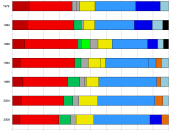On January 1, 1999, eleven (Austria, Belgium, Finland, France, Germany, Ireland, Italy, Luxumbourg, the Netherlands, Portugal, and Spain) out of the fifteen European countries that make up the European Union(EU) formed the Economic and Monetary Union(EMU) and began using a common currency, the euro. Greece joined as of January 1, 2001. The remaining three countries, Denmark, Sweden, and the United Kingdom have yet to join the EMU either because they do not meet the criteria set in the Maastrict Treaty(the agreement establishing the European Union and the economic requirements for admission in the the Economic and Monetary Union) or because they believe that the EMU's costs outweighs the benefits. The use of the euro currency will unite the existing member states creating a European super nation this will have an effect on individuals, businesses, economies and governments.
Before Britain adapts the Euro currency the following five criteria must be satisfied:
*The budget deficit has to be less than 3% of Gross Domestic Product
*The government's total debt has to be less than 60% of Gross Domestic Product
*Inflation has to be less than 1.5%
higher than the average of the lowest inflation countries
*Exchange rates should be stable
*Long term interest rates must be within 2% of the three lowest interest rates in EU.
On June 9, 2003 the United Kingdom Government published the assessment of five economic tests which include convergence, flexibility, investment, UK Financial services industry, and the effect on employment. The first condition would require the convergence of the UK economy with that of Europe's, so that the UK would be able to live comfortably with the interest rates set by the European Central Bank on a permanent basis. The second condition will verify whether there is enough flexibility to adjust to change and to unexpected economic...


